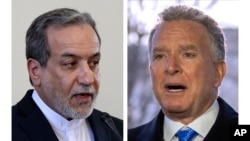A fifth round of nuclear talks between the United States and Iran has concluded in Rome with signs of limited progress in the negotiations over Iran's nuclear program.
The negotiations, which were mediated by Oman at the residence of the country's ambassador to Italy, ended after about two hours.
Both Washington and Tehran took tough positions heading into the talks on Iran's uranium enrichment, but Iranian Foreign Minister Abbas Araqchi said there was potential for progress after Oman made several proposals.
"We have just completed one of the most professional rounds of talks.... We firmly stated Iran's position.... The fact that we are now on a reasonable path, in my view, is itself a sign of progress," Araqchi told state television.
"The proposals and solutions will be reviewed in respective capitals...and the next round of talks will be scheduled accordingly," he added.
Ahead of the talks, Araqchi said on X that figuring out the path to a deal is not "rocket science," adding: "Zero nuclear weapons = we Do have a deal. Zero enrichment = we do NOT have a deal. Time to decide."
Omani Foreign Minister Mohammed Albusaidi said the round of talks ended with "some progress but no definitive outcome."
He expressed hope that "in the coming days we will clarify the remaining issues, allowing us to move toward the common goal of reaching a lasting and honorable agreement" but provided no details.
An unidentified senior US official said the talks lasted more than two hours and were both direct and indirect with Omani mediators.
"The talks continue to be constructive -- we made further progress, but there is still work to be done. Both sides agreed to meet again in the near future. We are grateful to our Omani partners for their continued facilitation," the official said, according to Reuters.
The main obstacle is Iran’s uranium enrichment capability -- something that the United States insists must be abandoned in any deal to ensure Iran will not weaponize its nuclear program.
But retaining the ability to enrich uranium has become a matter of principle for Iran. Araqchi has said enrichment will continue “with or without a deal.”
The Trump administration maintains that Iran must completely stop its enrichment activities -- a stance that US special envoy Steve Witkoff recently described as essential “because enrichment enables weaponization.”
Echoing this position, Secretary of State Marco Rubio told a Senate committee on May 21 that “any level of domestic enrichment is unacceptable and poses a direct threat.”
Witkoff, who has been representing the United States in the talks, has shifted his position since the Oman-mediated negotiations started in April. At one point, he suggested that Washington would agree to Iran enriching uranium to 3.67 percent purity -- as set under the 2015 nuclear accord that Trump abrogated in his first time in office.
One idea put forward to salvage the talks and reach an agreement is the establishment of a regional nuclear consortium that would include Iran, Saudi Arabia, and the United Arab Emirates, with the potential for American involvement.
Araqchi this week said Iran was not opposed to the idea but insisted no initiative would result in Iran giving up the ability to enrich uranium on its soil.
A new report this week by the US Defense Intelligence Agency said Iran “almost certainly is not producing nuclear weapons” but has “undertaken activities in recent years that better position it to produce them, if it chooses to do so.”
Iran is currently enriching uranium to 60 percent purity, which is close to weapons-grade levels, and has said that while it is willing to scale it back, it needs uranium enriched at 20 percent for its Tehran reactor.
Meanwhile, European powers have threatened to trigger the 2015 deal’s “snapback” of UN sanctions against Iran if it fails to reach a deal with the United States by the end of June. The power to use the mechanism expires in October, so Iran, which has warned of consequences if the sanctions return, is in a race against time.
Separately, Israel is reportedly preparing to strike Iranian nuclear sites in the absence of a deal, prompting Araqchi to warn of “special measures” Iran would take if attacked.










